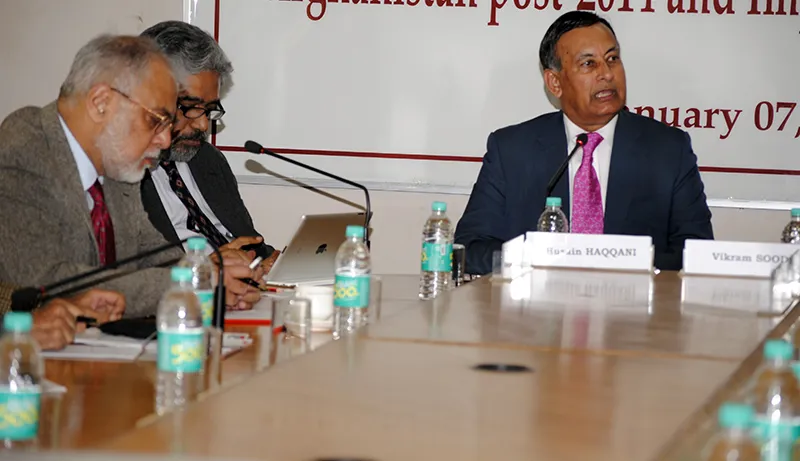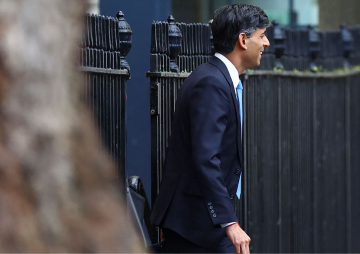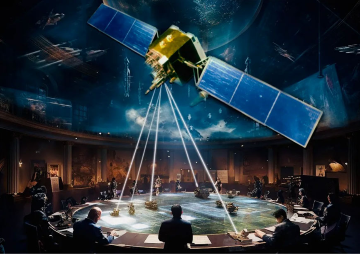Former Pakistan Ambassador to the United States, Mr. Hussain Haqqani, has urged regional powers to begin dialogue to prevent Afghanistan from slipping into a civil war situation after the US pullout later this year.

Former Pakistan Ambassador to the United States, Mr. Hussain Haqqani, has urged regional powers to begin dialogue to prevent Afghanistan from slipping into a civil war situation after the US pullout later this year. "It is not in the interest of anyone to see civil war in Afghanistan," Mr Haqqani, Senior Fellow and Director for South and Central Asia at the Hudson Institute, said at a roundtable discussion on "Afghanistan post 2014 and the Implications for the Region" at Observer Research Foundation in Delhi on January 7, 2014.
He pointed out that regional neighbours like Iran, Central Asia, China and India would want a stable Afghanistan. It is not in the interest of anyone to have a new civil war in Afghanistan. There should ideally be a dialogue amongst the major regional powers to decide not to foment or create civil war or to exacerbate the situation if it does break out.
According to Husain Haqqani, Americans don’t always lose wars, they lose interest and then they back away. But despite this, the centre can and will hold. Reasonably strong institutions have been built in Afghanistan over the last few years and these will endure. But it is important to make sure that no civil war breaks out but if it does occur, and then the regional actors should stay out of it.
He said the Taliban will continue to remain a nuisance, it will depend on Pakistan offering shelter and safe haven to the Taliban and its allied groups. Mr Haqqani believed that the army and police force in Afghanistan were more effective than they were given credit for. But the real question, he said, was who would foot the bill? He cautioned that the funds committed in the recent years at Tokyo and Chicago conferences would be difficult to come by once the foreign troops leave Afghanistan. This could pose a serious challenge to the new Afghanistan government.
He was equally worried about the re-emergence of al Qaida in the Pasthun-dominated areas along Durand Line in Afghanistan and Pakistan. He pointed out that Drone attacks alone would not contain the problem of terrorism in the region. The targets of these attacks have largely leaders of the `last war`. The terrorists groups are now led by a new generation of jihadis.
Talking about the US drawdown, Mr Haqqani said though the number of foreign troops would come down by 2015, the US would not completely abandon Afghanistan. He pointed out that the US interest in Afghanistan had been declining but the Afghans have been preparing for this eventuality. Mr Haqqani said he was confident that the Afghan army and police, well armed and trained, would be able to hold on after the US pullout. He was equally confident that the institutions set up in the last decade would endure the transition.
On the elections, he said, Afghanistan was a fragmented society and the April presidential elections would be influenced by ethnic and other local factors. He felt that it would be difficult to get a clear winner in the first round. The results are likely to be fractured. He believed that the presidential election in Afghanistan is not necessarily bring to power somebody very strong as there would be compromises in the electoral processes, especially in the second round when a candidate fails to get the mandatory 50+ percentage in the first round.
Referring to Pakistan’s role, the former Ambassador said Pakistan must recognise that cross-border ethnic kinship was a reality. It is assumed that there are only two situations that could occur. The first is that the Pashtuns on the Afghanistan side would incite Pakistani Pashtuns and look for a greater Pashtunistan. The second scenario is that Islamic nationalism could bring the Afghan Pashtuns closer to Pakistan. The second situation is less likely and Pakistan should turn away from this policy but may not be able to do so. While the civilian leadership has been vocal about not wanting to decide the winner or loser in the Afghan elections, there are others like General Aslam Beg who insist that Pakistan must prepare for a civil war in Afghanistan.
If Afghanistan falls into civil war, irrespective of whether Prime Minister Nawaz Sharif can ensure the non-involvement of the ISI, there will still be some participation from Pakistan. The Pakistani Jihadi groups will continue to provide support. Escalation of Jihadi activities against Pakistan will depend on whether they see the Pakistani government as aiding their activities or not.
Referring to India-Pak relations, Mr Haqqani said the national discourse in Pakistan was increasingly dominated by the `mosque`. He believed that if there was to be a significant breakthrough in the bilateral relations, the discourse in Pakistan must become less venomous. Foreign policy should not be based on contrived emotions.
In his concluding remarks, he said while the situation in Afghanistan was not going to be the same as 1990, but it could be 1990-lite.
Dr. C. Raja Mohan, Distinguished Fellow at ORF, presented India’s perspective on the issue. He mentioned that at present Indian opinion was divided because of the impending elections and there was no consensus on dealing with the challenges from across the border.
The post-9/11 situation threw up a number of difficulties with Pakistan but has, nevertheless, been a relatively good period for relations between the two countries. Cross-border terrorism did not end but there was an interesting phase of substantive negotiations with Pakistan. India was also welcoming of American presence in Afghanistan but American pressure on Pakistan to cease its cross-border terrorism was not entirely successful. There is expanded economic engagement and people-to-people contact between the two countries and there were also negotiations on Kashmir.
But post 2014, a very different situation will emerge. While life will go on, the question is what that life will look like. The American commitment for sustained engagement in Afghanistan will be difficult to continue because of domestic politics. Also, the Afghan state will weaken. There will also be economic shrinkage because of the pullout of foreign economic aid. Internal reconciliation will be difficult and what Pakistan does will be significant.
India cannot compete with Pakistan in Afghanistan because of geographical factors. Anything India can do is limited which is why Indians have such a good image in Afghanistan. The biggest strength for Pakistan is the border it shares with Afghanistan but this is also its biggest weakness. This does not, however, mean that India has no role. While there cannot be symmetric competition between India and Pakistan in Afghanistan, India can give military assistance according to the strategic partnership agreement as well as economic support.
Pakistan’s strategic depth is in India and this argument has been made in Pakistan but not by the army. While analytics point to a negative and difficult situation, it is possible to construct a different scenario. It is in India’s interests to conceptualise ways to ensure trilateral cooperation between the states.
Mr. Wilson John, Senior Fellow at the Observer Research Foundation spoke about dealing with an anxious and unpredictable Pakistan which would be the biggest challenge for the region. Pakistan faces serious challenges from and in Afghanistan and most of these relate to security. There are three dimensions to these security threats.
The first dimension is the threat faced from terrorist groups from inside and outside Pakistan. Violence has been increasing and there is a failure or inability to contain and neutralise militant groups due to the traditional policy of cherry picking the groups to target. There is policy paralysis in Rawalpindi in dealing with the militant groups.
The second is the insecurity caused by the consolidation of Pashtuns along the Durand Line. This fear is exacerbated by the emergence of the Afghan National Security Forces.
The third dimension is the presence and influence of external powers especially India and the US. There is paranoia in Pakistan of Indian encirclement. The US presence has also had its affect especially with the killing Osama bin Laden in Abbottabad in May 2011 was a serious blow to the seemingly indestructible image of the Pakistan army.
Pakistan has relied on militant groups to conduct operations against unfriendly states but there was a failure in seeing the consequences of such a policy. Pakistan’s policy in the future will likely involve wanting a proxy government in Kabul, containing India and figuring out how to deal with various terrorist groups. But the problem is that Pakistan is not looking beyond 2014-2015 and isn’t looking for a long-term solution. Pakistan has set itself a goal in Afghanistan which it is neither capable of achieving nor can it be managed without harming its own interests.
The talk was followed by nearly an hour-long question and answer session on a wide range of topics that concerned the future of Afghanistan and the region.
(This report is prepared by Taruni Kumar, Research Assistant, Observer Research Foundation)
The views expressed above belong to the author(s). ORF research and analyses now available on Telegram! Click here to access our curated content — blogs, longforms and interviews.




 PREV
PREV

